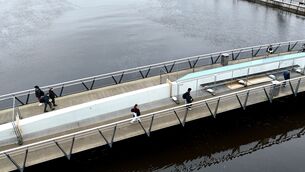Agency staff in Cork hospitals cost HSE €12m so far this year

Since 2021, €120m has been spent on agency staff in Cork hospitals — €66.8m in CUH, €16.7m in MUH, €13.9m in Bantry, €11.6m in SIVUH, €7.4m in Mallow and €4.1m in CUMH.
Data provided to Sinn Féin health spokesperson David Cullinane showed that the HSE spent a total of €31.2m last year on healthcare professionals who work for staffing agencies and are assigned to healthcare facilities on a temporary basis, for six Cork hospitals.
This year, up to the end of May, a total of €12.2m has been spent on these staff, who are used to fill gaps in permanent staffing. That is an average of €2.44m per month, close to last year’s monthly average of €2.6m.
In Cork University Hospital (CUH), where the majority of agency funds were spent, the total cost of hiring temporary staff almost doubled between 2021 and 2024.
In the first five months of 2025, CUH spent €7.2m on agency staff, while Mercy University Hospital spent €1.2m, nearly €2m was spent in Bantry General Hospital, and just over €1m in Mallow General Hospital.
South Infirmary University Hospital spent €346,000, while Cork University Maternity Hospital spent €462,000.
Last year, CUH spent €19.5m, MUH spent €3.6m, Bantry spent €4.1m, Mallow spent €2.3m, CUMH spent €1m and SIVUH spent €492,000.
Since 2021, €120m has been spent on agency staff in Cork hospitals — €66.8m in CUH, €16.7m in MUH, €13.9m in Bantry, €11.6m in SIVUH, €7.4m in Mallow and €4.1m in CUMH.
Sinn Féin TD for Cork North Central Thomas Gould told The Echo that the spending on agency staff was “extremely concerning”.
He said: “This is not sustainable spending of money – it is supposed to be funding that is only used in emergencies.
“Because of Fianna Fáil and Fine Gael failings in health services in Cork, they are constantly in a state of emergency. What we need to see is a move to permanent jobs to fill these gaps – pensionable employment that doesn’t see the government haemorrhaging more public money.” A HSE spokesperson explained:
“This is not unique to Ireland, but rather a global health workforce challenge. Recruitment and retention of clinical, nursing and other key staff is a constant challenge and impacts adversely on the ability to maintain safe and effective services.
“This can be for a variety of reasons, including sick absence replacement, both long and short term, to replace vacancies currently being actively recruited to, to replace maternity leave etc.”
They added: “In advance of the filling of these hours via direct employees, there is a need to prioritise critical services for replacement through agency and overtime. Collectively, these give rise to the utilisation of agency resources however while simultaneously running large scale domestic and international recruitment campaigns to fill through direct employment.
“At times the HSE have been unable to fill a vacancy even via agency. The agencies have indicated that they are experiencing difficulty in recruiting themselves due to a lack of availability and also accommodation availability and costs.”
The spokesperson said that the HSE are committed to fully delivering on improvements around waiting lists and emergency care, which “required the dual approach of improving the productivity of key services and managing the level and affordability of our workforce”.
“This is particularly focused around staffing levels, including getting to levels of agency and overtime which is sustainable into 2025.”










 App?
App?


